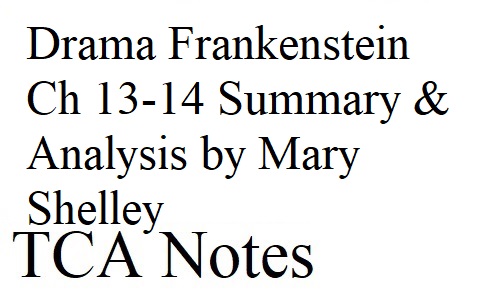Drama Frankenstein Ch 13-14 Summary & Analysis by Mary Shelley
tcanotes, Summary, Short Stories, Poems, Novel, English Literature, Prose, Drama, Frankenstein, Mary Shelley, English Essays, TCA Notes, The Concept Academy Notes
To view related topics Click Here.
Summary: Chapter 13
As winter thaws into spring, the monster notices that the cottagers, particularly Felix, seem unhappy. A beautiful woman in a dark dress and veil arrives at the cottage on horseback and asks to see Felix. Felix becomes ecstatic the moment he sees her. The woman, who does not speak the language of the cottagers, is named Safie. She moves into the cottage, and the mood of the household immediately brightens. As Safie learns the language of the cottagers, so does the monster. He also learns to read, and, since Felix uses Constantin-François de Volney’s Ruins of Empires to instruct Safie, he learns a bit of world history in the process.
Now able to speak and understand the language perfectly, the monster learns about human society by listening to the cottagers’ conversations. Reflecting on his own situation, he realizes that he is deformed and alone. “Was I then a monster,” he asks, “a blot upon the earth, from which all men fled, and whom all men disowned?” He also learns about the pleasures and obligations of the family and of human relations in general, which deepens the agony of his own isolation.
Summary: Chapter 14
After some time, the monster’s constant eavesdropping allows him to reconstruct the history of the cottagers. The old man, De Lacey, was once an affluent and successful citizen in Paris; his children, Agatha and Felix, were well-respected members of the community. Safie’s father, a Turk, was falsely accused of a crime and sentenced to death. Felix visited the Turk in prison and met his daughter, with whom he immediately fell in love. Safie sent Felix letters thanking him for his intention to help her father and recounting the circumstances of her plight (the monster tells Victor that he copied some of these letters and offers them as proof that his tale is true).
The letters relate that Safie’s mother was a Christian Arab who had been enslaved by the Turks before marrying her father. She inculcated in Safie an independence and intelligence. Safie was eager to marry a European man and thereby escape the near-slavery that awaited her in Turkey. Felix successfully coordinated her father’s escape from prison, but when the plot was discovered, Felix, Agatha, and De Lacey were exiled from France and stripped of their wealth. They then moved into the cottage in Germany upon which the monster has stumbled. Meanwhile, the Turk tried to force Safie to return to Constantinople with him, but she managed to escape with some money and the knowledge of Felix’s whereabouts.
Analysis: Chapters 13–14
The subplot of Safie and the cottagers adds yet another set of voices to the novel. Their story is transmitted from the cottagers to the monster, from the monster to Victor, from Victor to Walton, and from Walton to his sister, at which point the reader finally gains access to it. This layering of stories within stories enables the reworking of familiar ideas in new contexts. One such idea is the sense of “otherness” that many characters in Frankenstein feel. The monster, whose solitude stems from being the only creature of his kind in existence and from being shunned by humanity, senses this quality of being different most powerfully. His deformity, his ability to survive extreme conditions, and the grotesque circumstances of his creation all serve to mark him as the ultimate outsider.
Victor, too, is an outsider, as his awful secret separates him from friends, family, and the rest of society. In the subplot of the cottagers, this idea recurs in the figures of both Safie and her father. His otherness as a Muslim Turk in Paris results in a threat to his life from the prejudiced figures in power. Her feelings of being oppressed by Islam’s confining gender roles compel her to seek escape to the more egalitarian ideas of Christianity.
The monster’s fascination with the relationship between Felix and Safie lies in his desperate desire for Victor to accept him. Felix’s willingness to risk everything for the sake of someone who has been unjustly punished gives the monster hope that Victor will recognize the hurtful injustice of abandoning him. However, just as Felix’s bravery in helping Safie’s father escape stands in stark contrast to Victor’s shameful unwillingness to save Justine, so does Felix’s compassion for Safie underscore Victor’s cold hatred for the monster.
Language and communication take center stage in these chapters, as the monster emerges from his infantile state and begins to understand and produce written and spoken language. His alienation from society, however, provides him no opportunity to communicate with others; rather, he is a one-way conduit, a voyeur, absorbing information from the cottagers without giving anything in return. The importance of language as a means of self-expression manifests itself in the monster’s encounter with Victor on the glacier. Just as each distinct narrative voice contributes to the novel’s richly woven web of allusions and biases, the monster’s romanticization of the cottagers as kind and friendly reflects his desperate desire for companionship and affection.
Texts play an important role throughout the novel, especially in shaping the monster’s conception of his identity and place in the world. As his language skills increase, the monster gains a sense of the world through Felix’s reading of Ruins of Empires. In these chapters, he acquires the ability to understand the crucial texts that he soon discovers, including Paradise Lost. This text introduces him to Adam and Satan, to both of whom he eventually compares himself.
In addition to shaping his identity, the written word provides the monster with a means of legitimizing his past. In offering to show Victor copies of Safie’s letters, he hopes to validate his perspective on the tragedy that has befallen them and thus gain Victor’s sympathy. His belief in the truth of the written word, however, seems particularly naïve in a novel with a narrative structure as complex as that of Frankenstein; just as he falsely assumes that Paradise Lost is historically accurate, he hopes groundlessly that his narrative can win Victor over.

tcanotes, Summary, Short Stories, Poems, Novel, English Literature, Prose, Drama, Frankenstein, Mary Shelley, English Essays, TCA Notes, The Concept Academy Notes































